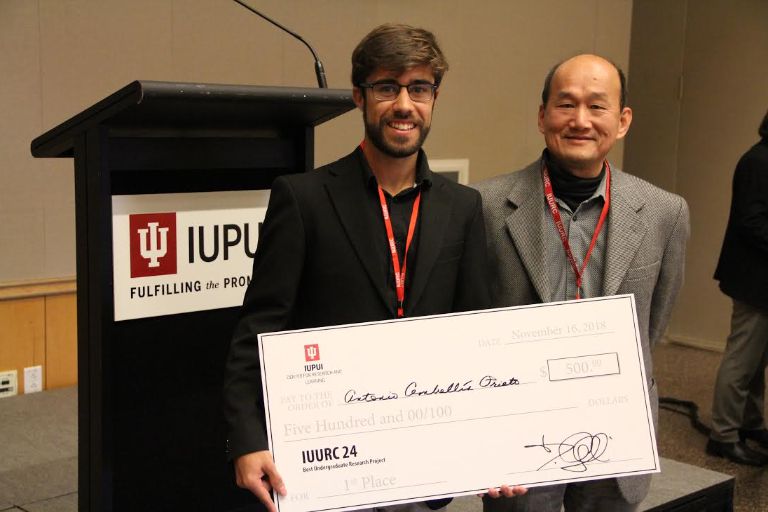Antonio Cembellin Prieto, a biotechnology major at IU, is one of three students from all nine of IUs campuses to receive a cash prize contribution for his research in biotechnology.
Though not all undergraduates are required to research biotechnology, Prieto’s research on antimicrobial peptides (AMPs) caught the IUURCs committee’s eye.
“We seek to develop new antimicrobial peptides from the cathelicidin class to be especially effective against Gram-negative bacteria, especially drug-resistant Enterobacteriaceae,” said Prieto.
Gram-negative bacteria can cause many types of infections and are spread to humans in various ways. They include those that cause foodborne illnesses, as well as waterborne pathogens. Enterobacteriaceae are a specific type of Gram-negative bacteria that includes illnesses such as Escherichia coli, Klebsiella, Salmonella, Shigella and Yersinia pestis.
Cathelicidins serve a critical role in mammals’ innate immune defense against invasive bacterial infections, therefore much of Prieto’s research has centered on modifying cathelicidin antibiotics to better combat antibiotic-resistant bacteria
His research aims to develop alternatives to antibiotics as the world enters a “post-antibiotic era.”
Prieto said the main goal in his research is to design and characterize the properties of several variants of the AMPs for efficacy against Gram-negative bacteria and for reduced cytotoxicity in animals.
Antibiotic resistance is a growing issue and new antibiotics are needed. According to Prieto, the CDC (center for disease control and prevention) reports that 2 million people in the United States are infected by antibiotic-resistant bacteria every year.
In order to combat the high rate of antibiotic-resistant bacteria, antibiotics must be chemically modified to increase their efficacy.
Studies from the British Government show if nothing is done about the alarming growth in antibiotic-resistant bacteria, more than 10 million are expected to die by 2050.
“Research requires advanced knowledge and is intellectually challenging,” Prieto said. “One of the biggest struggles that I face when conducting my research is the organization of new ideas and how to make the smartest choices to get the best results.”
Prieto said the easiest part of his research is coming up with new ideas that he then struggles to properly organize.
“Creativity in research is a very special skill, but the organization is also needed. I have an incredible mentor that helps me decide the smartest ideas and guide me in the way to make new breakthroughs,” he said.
Prieto’s research mentor, Dr. Cheng Kao, is a molecular and cellular biochemistry professor at IU. He also works as an adjunct biology professor. His studies focus on how RNA viruses interact with the host cell. RNA viruses are viruses that contain genetic information in the form of RNA, rather than DNA.
“To present my two-year research with Dr. Cheng Kao was an unforgettable experience,” Prieto said. “We have also filed a U.S. Patent Application that hopefully will be processed and accepted soon. We also have a paper ready for submission for publication.”
Prieto said winning the UG Research Project Award has given him plenty of experience and the chance to display his hard work ethic to future employers.
“I have used this award as an opportunity to represent myself as a highly motivated student to apply for graduate schools next year,” he said. “Winning this award has had a great impact on my future career goal.”
To learn more about IUURC Award winners past and present, please visit:https://crl.iupui.edu/iuurc/iuurcawards/.To learn about opportunities at IU Bloomington, visit: https://engagedlearning.indiana.edu.


